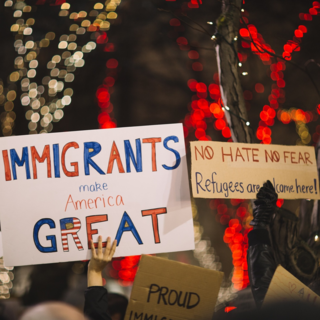Sport and Competition
The Psychology of "Us-vs-Them"
The mass shooter in El Paso seemed to have an us-vs-them mentality. Why?
Posted August 9, 2019 Reviewed by Matt Huston

Americans versus them
The El Paso mass shooter had allegedly “wanted to shoot as many Mexicans as possible.” He had posted a manifesto that “spoke of a ‘Hispanic invasion of Texas.’ It detailed a plan to separate America into territories by race.
There are different ways of trying to make sense of such an extreme mentality, but one way is to consider it as a form of us-versus-them thinking—oversimplifying and distorting complex problems by dividing the world into an us and a them, and scapegoating and vilifying the latter.
Psychological theories of us-versus-them
Examples of us-versus-them mentality can be seen in sports and other team-based activities but also in numerous other areas in life; the polarizing political rhetoric of Donald Trump, for instance, can be rife with it.
So what gives rise to us-versus-them views? Consider two theories:
One psychological theory suggests when we perceive that our group is in direct competition with another, especially over a limited resource, we are likely to experience hostility toward members of that group.
For instance, if we (people of the host country) are financially struggling and think that immigrants are contributing to the economy only by taking our jobs—as Donald Trump suggests and his supporters seem to believe—we feel hostile toward immigrants.
Note that the political us-versus-them divisions are not only concerned with immigrant status; they often also concern nationalities, racial categories, and ethnic groups (e.g., Mexicans, South Americans, Africans, Blacks, Middle Easterners, Jews, Muslims). As Peter Baker recently wrote, Trump seems to be “drawing a deep line between the white, native-born America of his memory and the ethnically diverse, increasingly foreign-born country he is presiding over, challenging voters in 2020 to declare which side of that line they are on.”
Identity and self-esteem
Let us now turn to the second psychological theory of us-versus-them, which suggests this mentality can arise even without the perception of competition; the mere categorization of people into an us and a them is enough to produce hostilities.
For example, many people feel proud of their country, even without comparing their country to other ones. If you consider the U.S. to be your country, you probably feel the same way about it; it is likely that even if you are very critical of certain Americans’ views, attitudes, laws, policies, or if you hate many American politicians (even the president), you are not necessarily truly ashamed of being an American. That on some deeper level, you are still proud of being an American. Why?
One reason for this is that our self-esteem comes partly from our group membership. We need to feel good about our group to feel good about ourselves.
This can apply to any type of group identity. For instance, a few days ago was the Vancouver LGBTQ (lesbian, gay, bisexual, transgender and queer) pride parade, a parade that has many purposes, one of which is to empower LGBTQ individuals to be proud (despite various pressures on them to feel ashamed) and to feel good about themselves.
Or consider the slogan of Donald Trump’s 2016 presidential campaign, Make America Great Again. Psychologically, the slogan is also the promise of making Americans feel not just good but great about being American.
Of course, one wonders, have not all presidents tried to make America great? The difference is how they have gone about doing so and whether they have been successful. To illustrate, Barack Obama emphasized the value of all Americans working together to improve the country.
The path Trump has chosen appears to be one of emphasizing differences and excluding or rejecting certain groups. While there are good reasons for keeping our distance from some people (e.g., actual murderers and rapists), there are many bad reasons (e.g., racism and group narcissism) for doing so too. So following this path of creating and emphasizing divisions may be a dangerous way of trying to improve one’s self-esteem and make America great.

Concluding thoughts on the us-versus-them mentality
The us-versus-them attitude is prevalent, and not just in politics. As fellow Psychology Today writer, Marika Lindholm, notes, these days we take sides on many issues: “Democrats vs. Republicans, vegetarians vs. carnivores, dogs vs. cats, breast vs. bottle, Coke vs. Pepsi.” Obviously taking sides on some issues (e.g., race and immigration) might have more serious consequences than others (e.g., chocolate or vanilla).
So what is the solution? The one offered by Lindholm involves “boundary spanners,” people like immigrants, biracial or bicultural individuals, gay military members, etc—individuals who belong to multiple groups and social worlds. She says instead of marginalizing boundary spanners, we should “honor and empower” them because they can help us bridge these us-versus-them divisions.
Nevertheless, such solutions are sometimes distorted into problems in need of solutions! This occurs when people or the media problematize individuals who are immigrant, biracial, transgender, etc. If you buy into such a narrative—that these issues are problems—then you will be less accepting of efforts to empower these people, and instead more open to rejecting and excluding them. Nonetheless, even if you are a staunch believer in the idea that race, gender, immigration status, etc, are the problem, consider what it would mean if instead of finger-pointing and creating/emphasizing divisions, we could work together to solve difficulties and issues that affect us all—issues concerning jobs, housing, education, healthcare, environment, and standards of living? What kind of United States of America would that be?




